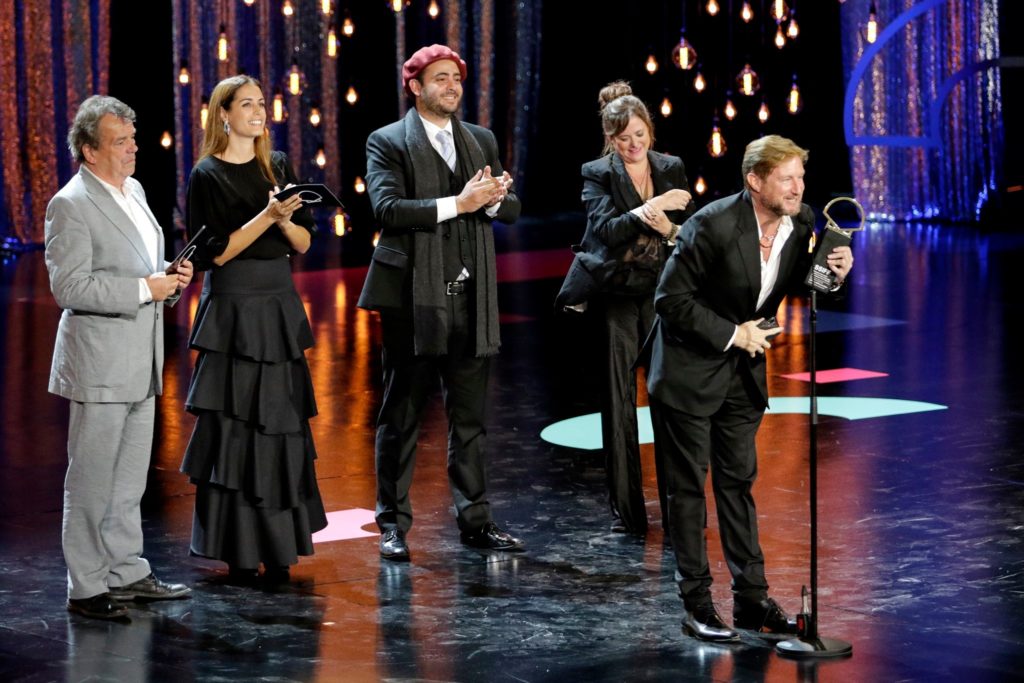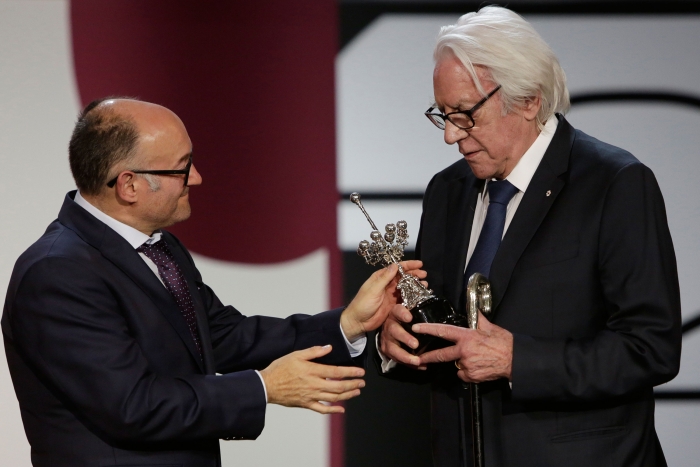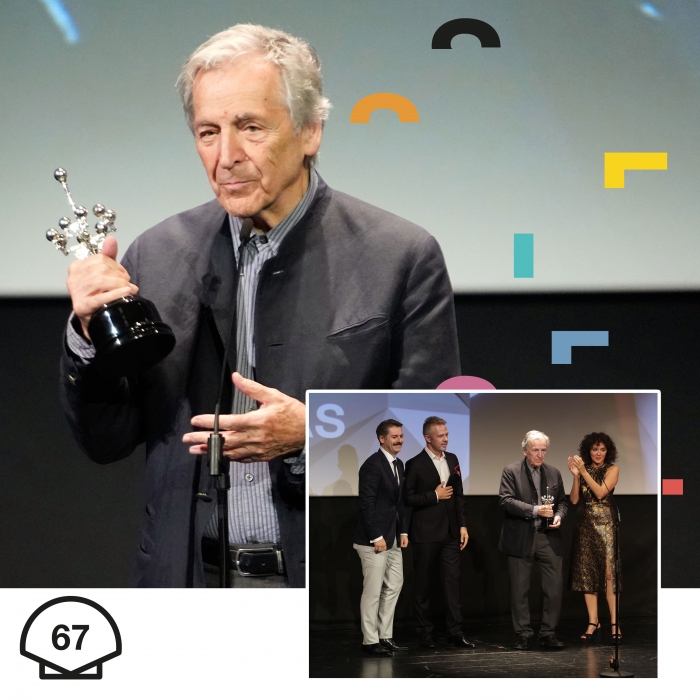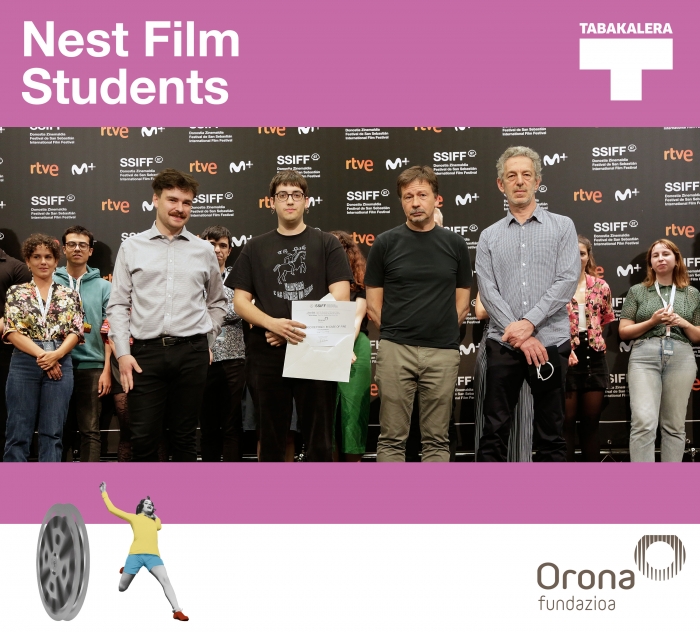
„Pacificado / Pacified“ wins the Golden Shell at the 67th edition of the San Sebastian Festival.
Aitor Arregi, Jon Garaño and Jose Mari Goenaga carry off the Silver Shell for Best Director with „La trinchera infinita / The Endless Trench“.
Greta Fernández and Nina Hoss win the Silver Shell for Best Actress ex aequo and Bukassa Kabengele does the same in the male category.
The Brazilian production Pacificado / Pacified, directed by the North American Paxton Winters, is the winner of the Golden Shell for Best Film at the 67th edition of the San Sebastian Festival. Darren Aronofsky, Paula Linhares, Marcos Tellecheak, Lisa Muskat and Winters himself are the producers of this film set in the favelas of Brazil. As well as carrying off the Festival’s highest accolade, Pacified garnered another two recognitions: the Best Actor Silver Shell for Bukassa Kabengele and the Award for Best Cinematography going to Laura Merians.

This year’s official awards were announced by the actress Natalia de Molina and the journalist Edurne Ormazabal during a gala held in the Kursaal Auditorium. Pacified, which will be distributed worldwide by Twentieth Century Fox, is the first Brazilian production to win the Golden Shell in the history of the Festival.
On the other hand, the Silver Shell for Best Director went to the trio made up of Aitor Arregi, Jon Garaño and Jose Mari Goenaga, the helmers of La trinchera infinita / The Endless Trench (Spain), which also bagged the Best Screenplay Award for Luiso Berdejo and Goenaga. In addition, Greta Fernández and Nina Hoss, the respective stars of La hija de un ladrón (Spain) and Das Vorspiel / The Audition (Germany-France), carried off the Silver Shell for Best Actress ex aequo. Finally, Proxima (France-Germany), by Alice Winocour, landed the Special Jury Prize “for its aesthetic ambition” and for “turning a drama of space exploration into an exploration of motherhood”.
Algunas bestias / Some Beasts (Chile) won the Kutxabank-New Directors Award, and in the same section a special mention went to Sestra / Sister (Bulgaria – Qatar), by Svetla Tsotsorkova. The Horizontes Award was presented to De nuevo otra vez / Again Once Again (Argentina), while the special mention went to Daniel and Diego Vega brothers for La bronca (Peru – Colombia). The Zabaltegi-Tabakalera was carried off by Angela Schanelec with Ich War Zuhause, Aber / I Was at Home, But (Germany – Serbia) and the special mention fell upon Les enfants D’Isadora / Isadora’s Children (France-South Korea), by Damien Manivel.
La trinchera infinita won the Irizar Basque Film Award, while Glittering Misfits, by Iban del Campo, obtained a special mention. The City of Donostia/San Sebastian Audience Award went to Hors normes (The Specials) (France), by Olivier Nakache and Eric Toledano, and the Audience Award for Best European Film was carried off by Sorry We Missed You (UK – France- Germany), by Ken Loach. Moreover, the TCM Youth Award went to Ana García Blaya for Las buenas intenciones / The Good Intentions (Argentina).
The gala hosts thanked the filmmakers, screenwriters, producers and stars for their presence during the nine days of the Festival, while also referring to the audience who “packed out the cinemas yet another year” and “turned even the smallest film into cinema with a capital letter”. “We could say that this closes a cycle, but it’s not true, because at the San Sebastian Festival farewells are only the start of a countdown until the next time we meet to watch more films. We therefore say au revoir in the best possible way, in the dark, with a film,” said De Molina and Ormazabal before introducing the screening of The Song of Names. The film’s director, François Girard, was present at the ceremony in the company of the actors Tim Roth and Catherine McCormack.
The actress received the San Sebastian Festival’s most important honorary award from Bono (U2) in a surprise ceremony.

Penélope Cruz (Madrid, 1974) has received the third Donostia Award of the 67th edition from Bono, the frontman of U2, at a gala representing a surprise for both the honoured guest and for the audience. This was the San Sebastian Festival’s tribute to the Spanish actress to enjoy greatest international recognition, who is also the image of the poster of its 67th edition.
In recent weeks, the Festival organisation has kept the identity of the person who will present Penélope Cruz with the award at the Kursaal a complete secret. The idea was not to reveal to the actress that her good friend Bono, to whom she presented the Los40 Golden Music Award in 2017, would be in San Sebastian to participate in the gala.
The Irish musician was introduced by surprise by José Luis Rebordinos, the Festival Director, and came down from the stalls to the stage where he and Penélope Cruz enveloped one another in a warm embrace. „Penélope’s life on the screen fascinates me because it is a family drama. Artists like us, like me, get lost in our own selves. Penélope gets lost in others. That’s why we get lost in her“, said Bono.

The audience gave the actress a heartfelt ovation lasting for several minutes. Having admitted that she didn’t expect the surprise and having declared her love for Bono, Cruz confessed that she was always „a great dreamer“. „Since I was a child I was aware that day-dreaming was the best way to shape a possible future provided that luck accompanies you along the way“, she said. Her childhood dreams were to become a mother and an actress and after so many years of work, her love for the profession „does nothing but continue to grow“. „This profession offers you moments when the soul flies; you need to shake off your ego to understand all of these different and fascinating lives and give each one of them all of the dignity and respect they deserve“, she indicated.
She also expressed her „boundless gratitude“ for an award which she dedicated to her parents, who have always supported her, and to the directors who have trusted in her, among whom she mentioned Pedro Almodóvar, Bigas Luna and Fernando Trueba. She also remembered professors like Juan Carlos Corazza and Cristina Rota, and her representative Katrina Bayonas, but the most emotional moment was when she dedicated the Donostia Award to her two children and to her husband Javier Bardem, who was present in the theatre and who was also „included“ in her dream.
Before ending her speech, she spoke out for „taking care of and protecting our shared home that is the world“ in order to give the children of today „more than enough reasons to continue dreaming“; and also voiced her condemnation of male violence against women.“This year alone 44 women have already been murdered as a result of male violence, and since 2003, the number of deaths amount to more than a thousand in our country alone. How many must there be in the world? When a woman finds the hugely enormous strength that it takes to speak out about living in a situation such as this, I hope that you listen to her straight away and not when it’s too late“, she ended.
Penélope Cruz, aged 45, is the youngest actress to have received the Donostia Award -Ewan McGregor was the youngest male actor to receive it when he was aged 41-. She received best supporting actress Academy Award and Bafta for her part in Vicky Cristina Barcelona (Woody Allen, Pearls 2008), three Goyas for her work in La niña de tus ojos (The Girl of Your Dreams, Fernando Trueba, 1998), Volver (Pedro Almodóvar, Fipresci Grand Prix 2005) and Vicky Cristina Barcelona, the best actress award with the other women in the cast at the Cannes Festival (Volver), the honorary César and the Gold Medal for Merit in the Fine Arts (2018), among many other awards.

Donald Sutherland (Saint John, New Brunswick, 1935) has received the second Donostia Award at the 67th edition of the San Sebastian Festival, which paid tribute to the actor for an excellent career spanning fifty years. The Canadian actor received the Festival’s highest honorary distinction from its Director, José Luis Rebordinos.
Before receiving the statuette, Donald Sutherland said thank you several times in Basque (“mila esker, Euskal Herria”) to the audience in the Kursaal as they gave him a standing ovation. „It’s such a pleasure, a delight to be in the Basque Country. I have huge respect for you and it is a great joy to be here with you. Mila esker, Euskal Herria”, said the actor.
Capable of shining with the same intensity either as the lead character or in a supporting role, Sutherland has shown great talent when embodying dozens of characters, with no regard for genre: from drama to war movies, including thrillers, horror and science fiction films. Despite never having received a Hollywood Academy Award nomination for any of his myriad parts, in 2017 he was presented with an Honorary Academy Award for his acting career.
Donald Sutherland is one of the most respected, prolific and versatile of motion picture actors, with an astonishing resume of well over one hundred and fifty films, including such classics as Robert Aldrich’s The Dirty Dozen; Robert Altman’s M.A.S.H.; John Schlesinger’s The Day of the Locust; Robert Redford’s Ordinary People; Bernardo Bertolucci’s 1900; Philip Kaufman’s Invasion of the Body Snatchers; Nicolas Roeg’s Don’t Look Now with Julie Christie; Alan Pakula’s Klute with Jane Fonda; Federico Fellini’s Fellini’s Casanova and Brian Hutton’s Kelly’s Heroes with Clint Eastwood (who later directed him in Space Cowboys).
Presented by the journalist Edurne Ormazabal, the gala took place this evening in the Kursaal, immediately followed by a screening of The Burnt Orange Heresy. Its director, Giuseppe Capotondi, presented this thriller in which Sutherland features in the cast alongside Claes Bang, Elizabeth Debicki and Mick Jagger.
“This award is so precious for us, the filmmakers“, said the director.

The French filmmaker of Greek origin, Costa-Gavras (Loutra-Iraias, 1933) has received the first Donostia Award at the 67th edition of the San Sebastian Festival which, with its highest honorary distinction, has paid tribute to one of the leading exponents of films on political and social issues in all history.
Tonight the Victoria Eugenia Theatre hosted the gala at which the award was presented, following the latest film by the director, Adults in the Room. The film takes to the big screen the book of memoires written by the former Greek Finance Minister, Yanis Varoufakis. The Donostia Award was presented to the filmmaker by the Festival Director, José Luis Rebordinos.
As recalled by Rebordinos, Costa-Gavras has always defended the fact that all cinema is political, highlighting his “cinematic precision” and his “determination to talk about things that happen in the society of his time”. “He analyses power and talks about people that power oppresses and makes invisible. This is a political award for Costa-Gavras”, he said.
“It is an enormous honour to receive this award, which is so precious for us, the filmmakers”, declared Costa-Gavras. Christos Loulis, Alexandros Bourdoumis and Valeria Golino, the stars of his last film, agreed that working with him is a dream come true. “We have needed him, we do need him, and we will continue to need him. Thank you, Costa-Gavras”, said Loulis, who embodies Varoufakis on the big screen.
The journalist Vanessa Rodrígues hosted the gala and took a look at the career of a director who, “with particular harshness and absolute freedom” has focussed his camera on totalitarian dictatorships, political purges, racism and the abuses of capitalism. A video was also screened with images of “a bold and highly personal filmography which makes an acerbic and critical examination of power and today’s society”.
Following his debut with Compartiment tueurs (The Sleeping Car Murders, 1965), Costa-Gavras directed titles such as Z (1969), winner of the Special Jury Prize and Best Actor Award for Jean-Louis Trintignant at the Cannes Festival, as well as the Best Film in a Foreign Language and Best Editing Academy Awards. Missing (1981), his first big hit shot in English, earned him the Best Screenplay Academy Award and Golden Palm at Cannes, where Jack Lemmon also garnered an award for his performance. Outstanding among his more recent films are Amen. (2001), Le couperet (The Axe, 2004) and Le capital (Capital, 2012), which competed in the Official Selection at the San Sebastian Festival.
Premiered at the recent Venice Mostra, his latest feature film is based on the book Adults in the Room: My Battle With Europe’s Deep Establishment, written by Yanis Varoufakis following his fleeting mandate as a minister during the first six months of 2015, at the height of the Greek financial crisis. The film is a “tragedy” in the classic sense of the term and portrays a group of people “trapped in an inhuman network of power” and in a “brutal circle of Eurogroup meetings, which imposed on Greece a dictatorship of austerity”.
Golden Shell for Best Film
PACIFICADO / PACIFIED
PAXTON WINTERS (BRAZIL)
Special Jury Prize
Proxima
Alice Winocour (France – Germany)
Silver Shell for Best Director
La trinchera infinita / The Endless Trench
Aitor Arregi, Jon Garaño, Jose Mari Goenaga (Spain – France)
Silver Shell for Best Actress
ex aequo Nina Hoss
Das Vorspiel / The Audition
Ina Weisse (Germany – France)
Greta Fernández
La hija de un ladrón / A Thief’s Daughter
Belén Funes (Spain)
Silver Shell for Best Actor
Bukassa Kabengele
Pacificado / Pacified
Paxton Winters (Brazil)
Jury Prize for Best Cinematography
Laura Merians
Pacificado / Pacified
Paxton Winters (Brazil)
Jury Prize for Best Screenplay
Luiso Berdejo, Jose Mari Goenaga‘
La trinchera infinita / The Endless Trench
Aitor Arregi, Jon Garaño, Jose Mari Goenaga (Spain – France)
Kutxabank-New Directors Award
Algunas bestias / Some Beasts
Jorge Riquelme Serrano (Chile)
| SPECIAL MENTION Sestra / Sister Svetla Tsotsorkova (Bulgaria – Qatar) |
Horizontes Award
| De nuevo otra vez / Again once Again Romina Paula (Argentina) |
| SPECIAL MENTION La bronca Diego Vega, Daniel Vega (Peru – Colombia) |
Zabaltegi-Tabakalera Award
| Ich war zuhause, aber / I Was at Home, but Angela Schanelec (Germany – Serbia) |
| SPECIAL MENTION Les enfants d’Isadora / Isadora’s Children Damien Manivel (France – South Korea) |

Nest Film Students Awards
| ORONA AWARD – Nest Film Students Best Short Film Em caso de fogo / In Case of Fire Short film by Tomás Paula Marques (Portugal) |
| SPECIAL MENTION Fiebre austral / Austral Fever Short film by Thomas Woodroffe Silva (Chile) |
City of Donostia / San Sebastian Audience Award
| Hors normes / The Specials Olivier Nakache, Éric Toledano (France) |
| Best European Film Sorry We Missed You Ken Loach (UK – France – Germany) |
Irizar Basque Film Award
| La trinchera infinita / The Endless Trench Aitor Arregi, Jon Garaño, Jose Mari Goenaga (Spain – France) |
| SPECIAL MENTION Glittering Misfits Iban del Campo (Spain) |
TCM Youth Award
| Las buenas intenciones / The Good Intentions Ana Garcia Blaya (Argentina) |

Films in Progress Award
| FILMS IN PROGRESS 36 INDUSTRY AWARD Sin señas particulares / Non Distinguishing Features Fernanda Valadez (Mexico) |
Glocal in Progress Award
| GLOCAL IN PROGRESS INDUSTRY AWARD & LOCAL IN PROGRESS AWARD Galaktika e Andromedës / Andromeda Galaxy More Raça (Kosovo – France – North Macedonia – Italy) |
Europe-Latin America Co-production Forum
| VIII EUROPE-LATIN AMERICA CO-PRODUCTION FORUM BEST PROJECT AWARD La hija de todas las rabias / Daughter of Rage Laura Baumeister (Nicaragua – Mexico – Netherlands – Germany) |
| EFADs-CAACI EUROPE-LATIN AMERICA CO-PRODUCTION GRANT La hija de todas las rabias / Daughter of Rage Laura Baumeister (Nicaragua – Mexico – Netherlands – Germany) |
| EURIMAGES DEVELOPMENT CO-PRODUCTION AWARD Almamula Juan Sebastian Torales (France – Argentina – Luxembourg) |
| ARTEKINO INTERNATIONAL PRIZE La hija de todas las rabias / Daughter of Rage Laura Baumeister (Nicaragua – Mexico – Netherlands – Germany) |
Ikusmira Berriak Award
| REC GRABAKETA ESTUDIOA POST-PRODUCTION AWARD Sem dor / Painless Michael Wahrmann (Brazil – Portugal – Argentina) |
Zinemaldia & Technology Saria
| ZINEMALDIA STARTUP CHALLENGE AWARD LargoAI (Switzerland) |
TVE-Another Look Award
| La ola verde (Que sea ley) / Let It Be Law Juan Solanas (Argentina – Uruguay – France) |
Spanish Cooperation Award
| Nuestras madres / Our Mothers César Díaz (France – Belgium – Guatemala) |
Donostia Award
 | Penélope Cruz |
 | Costa-Gavras |
 | Donald Sutherland |
Zinemira Award
 | Jose María „Txepe“ Lara |
FIPRESCI Award
| La trinchera infinita / The Endless Trench Aitor Arregi, Jon Garaño, Jose Mari Goenaga (Spain – France) |
Zinemaldia FEROZ Award
| La trinchera infinita / The Endless Trench Aitor Arregi, Jon Garaño, Jose Mari Goenaga (Spain – France) |
Award to the Basque Best Screenplay
| Luiso Berdejo, Jose Mari Goenaga La trinchera infinita / The Endless Trench Aitor Arregi, Jon Garaño, Jose Mari Goenaga (Spain – France) |
Greenpeace – Lurra Award
| Le milieu de l’horizon / Beyond the Horizon Delphine Lehericey (Switzerland – Belgium) |
SIGNIS Award
| Rocks Sarah Gavron (UK) |
| SPECIAL MENTION Proxima Alice Winocour (France – Germany) |
Guipuzcoan Blood-Donors’ Association Corresponding to the Solidarity Award
| Il pleuvait des oiseaux / And the Birds Rained Down Louise Archambault (Canada) |
Sebastiane Award
| Monos Alejandro Landes (Colombia – Argentina – Netherlands – Germany – Sweden – Uruguay) |
Ateneo Guipuzcoano Award
| Das Vorspiel / The Audition Ina Weisse (Germany – France) |
X